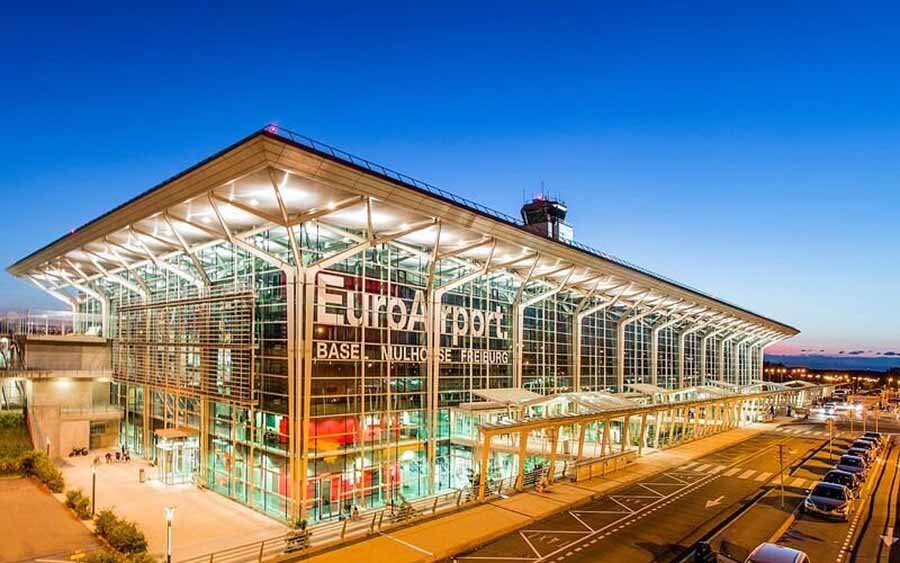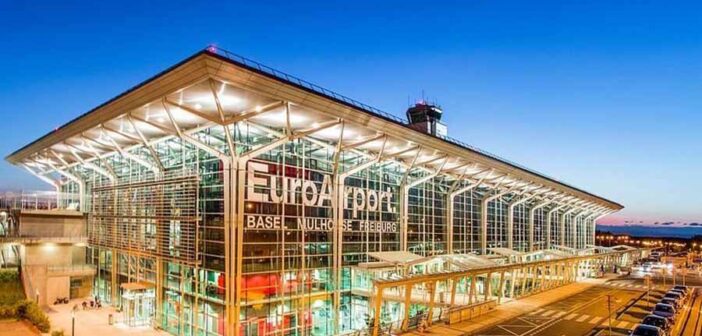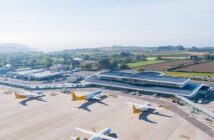
EuroAirport Basel-Mulhouse-Freiburg, located four kilometres northwest of Basel, Switzerland, and serving Mulhouse, France, and Freiburg, Germany, is a unique binational airport operated jointly by France and Switzerland. Handling nearly nine million passengers in 2024, it acts as a base for easyJet Switzerland and Corendon Airlines Europe, connecting to over 100 destinations across Europe, North Africa, and the Middle East. Its compact terminal and practical amenities provide a smooth journey for travellers exploring the tri-border region or catching connecting flights.
Accessing the airport is straightforward, with convenient transport options to Basel, Mulhouse, and Freiburg. Bus Line 50 connects to Basel’s SBB railway station in 23 minutes for about €3 to €5, running every 10 to 30 minutes. Bus 11 links to Saint-Louis station in France for onward train connections, while FlixBus and the 220 FREUND regional bus serve Freiburg, taking 60 to 90 minutes.
Taxis, available outside the terminal, reach Basel in 12 minutes for €45, Mulhouse for €60 to €65, or Freiburg for €155 to €165, with night fares higher. Drivers can use the A35 motorway (France) or Swiss roads, with a 10- to 15-minute journey from Basel, though peak-hour traffic may cause delays. Car hire desks from Avis, Hertz, and Europcar are located in the arrivals hall.
The single terminal, divided into Swiss and French sectors, spans four levels, with arrivals and baggage claim on Level 2, check-in on Level 3, and 60 boarding gates on Level 4, including six jet bridges. The layout is clear, with short walking distances, but the division into Schengen and non-Schengen zones can confuse first-time visitors, so checking sector-specific signage is advised.
Security screening averages 10 to 20 minutes, but peak summer periods or disorganised passport control can extend waits to 45 minutes, so arriving two hours early for Schengen or three for non-Schengen flights is recommended. Fast Track services can expedite the process. Fog, air traffic control issues, or baggage handling delays may disrupt flights, so monitoring updates via euroairport.com or Flightradar24 is wise.
Dining and retail options are modest but cater to essential needs. Landside, Columbus Café & Co. and Fourchette Suisse serve baguettes and coffee, while airside, Paul and Starbucks offer quick bites. Aelia Duty-Free shops provide perfumes, spirits, and souvenirs, but prices are high—€3 for water or €7 for coffee—and some cafés close early evening. The Skyview Lounge on Level 4, open to all passengers for a fee, offers complimentary food, drinks, and Wi-Fi in a quiet setting. Passengers seeking more dining choices may need to eat in Basel or Mulhouse before arriving.
Facilities are functional, though some areas feel dated. Free Wi-Fi is available via “AdP_FreeWifi” after registration, but seating is limited, often forcing passengers to sit on the floor, and charging points are scarce, so a power bank is useful. Accessibility features include lifts, accessible toilets, and assistance services bookable through airlines, though no shuttle connects car parks to the terminal, requiring pre-arranged support for reduced mobility passengers. A business centre offers meeting spaces, and a chapel, ATMs, and currency exchange are available. Parking includes 2,700 spaces in a multi-storey car park, with rates starting at €5 per hour, and nearby hotels like HotelF1 and Ibis, two kilometres away, offer budget stays.
On-time performance is generally reliable, with a 76% on-time rate for airlines like easyJet and Air France, though recent reviews note occasional delays due to disorganised processes or weather. The airport supports limited connections, primarily through hubs like Amsterdam or Frankfurt, with minimum connection times of 45 minutes for Schengen-to-Schengen and 75 minutes for non-Schengen transfers. Self-transferring passengers must clear customs and recheck baggage, requiring extra time, especially in the French sector. Weather, staffing shortages, or outdated baggage systems are primary delay causes, particularly in peak seasons.
Ryanair
Ryanair operates flights to Dublin on Mondays, Wednesdays, and Fridays from the Swiss sector of the airport, with check-in desks typically in the main check-in hall (desks 1–10 or 20–30). Exact desks are displayed on airport screens.
Flights to Ireland (e.g., Dublin) usually depart from the non-Schengen gates (e.g., gates 22–32) in the Swiss sector. Gates are confirmed on departure boards.




